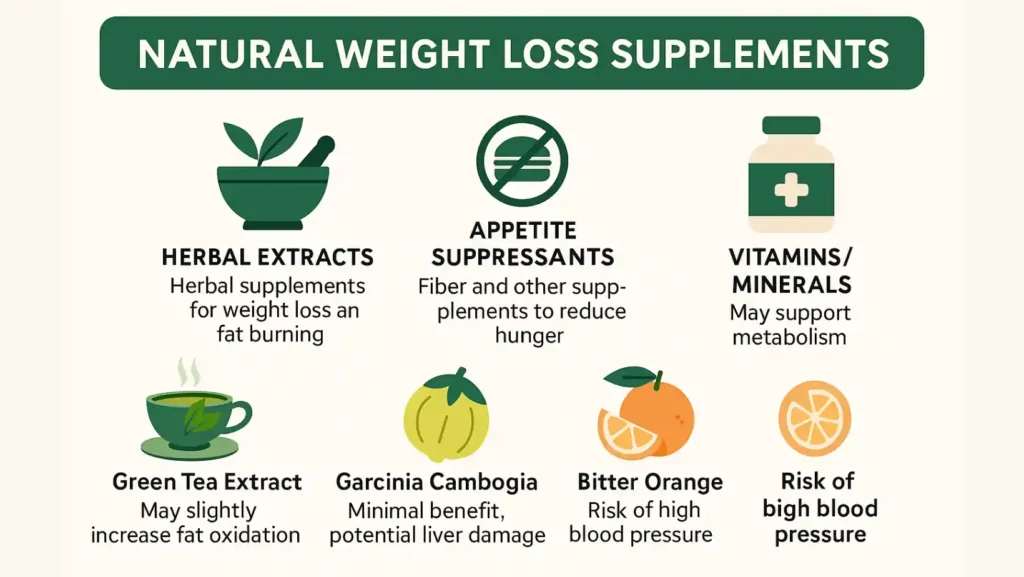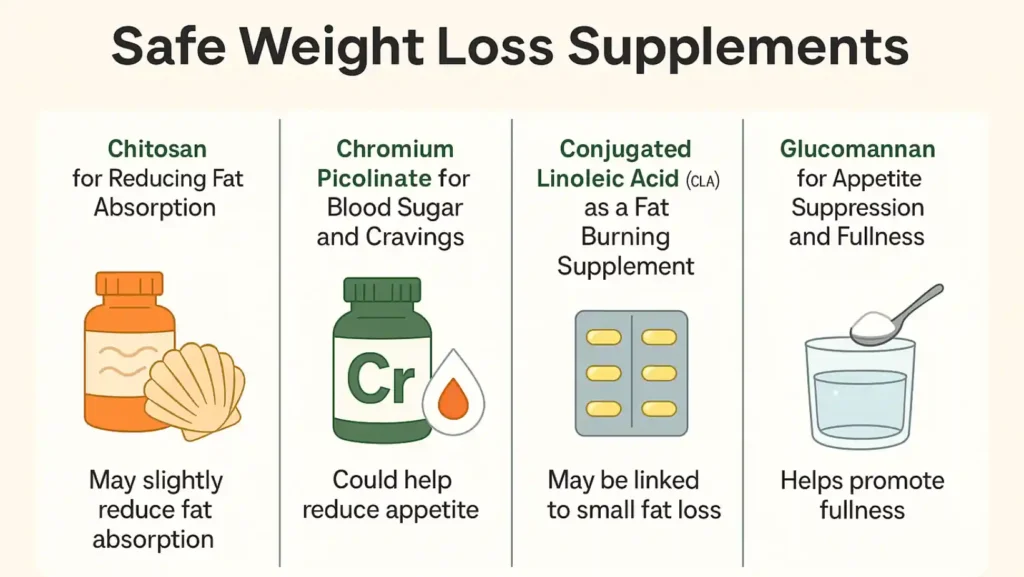Supplements for weight loss are one of the most searched topics for people who want faster results from dieting and exercise. With so many pills, powders, and herbal blends on shelves, it is easy to get confused about what works and what is just hype. Some products have evidence behind them. Others are risky and may even harm health. This guide will explore the types of supplements, how they claim to work, what research says, and which options might be safer to consider.
Natural Weight Loss Supplements: Do They Work?
Many people prefer natural weight loss supplements because they believe plant-based or vitamin products are safer. Natural, however, does not always mean safe or effective. These products usually fall into three categories: herbal extracts, appetite suppressants, and vitamins or minerals that support metabolism. Each has its own set of benefits, limits, and risks.
Herbal Supplements for Weight Loss and Fat Burning
herbal supplements for weight loss are widely promoted as fat burning supplements. Examples include green tea extract, garcinia cambogia, and bitter orange.
- Green tea extract is rich in catechins like EGCG, which may slightly increase fat oxidation. When combined with caffeine for fat loss, it may provide a small calorie-burning boost.
- Garcinia cambogia supplement was once popular for its hydroxycitric acid content, believed to block fat production. However, later research showed minimal benefit and rare reports of liver damage.
- Bitter orange contains synephrine, which mimics ephedra. Some studies suggest a rise in metabolism, but it carries a risk of high blood pressure and heart rhythm changes.
Herbal extracts can interact with prescription drugs. They also vary in strength depending on the brand. Evidence suggests that herbs alone rarely cause major fat loss.
Appetite Suppressant Supplements and Portion Control
The goal of appetite suppressant supplements is to help people feel full sooner and reduce calorie intake. Natural fibers like glucomannan and guar gum are the most studied.
- Glucomannan expands in the stomach and may reduce hunger, but results differ from person to person. Some trials showed a slight weight drop, others found no change.
- Guar gum can slow digestion, yet large doses may block the esophagus or intestines if not taken with enough water.
Synthetic appetite suppressants once sold as diet aids are no longer available due to safety concerns. Supplements that use natural fiber remain the safer route, but results are mild compared to diet changes.
Vitamins for Weight Loss and Metabolism Support
People often take vitamins for weight loss to make sure their body has what it needs for energy use.
- Magnesium helps regulate insulin and glucose control, and a lack of it may contribute to weight gain.
- B-vitamins support energy production and may reduce fatigue during exercise.
- Vitamin D deficiency is linked to obesity, though supplements alone rarely reduce fat.
These products should be viewed as support rather than a direct way to burn calories. They may help people who are deficient in certain nutrients, but they are not fat-burning pills.
Safe Weight Loss Supplements to Consider

Some safe weight loss supplements have undergone studies and may offer small benefits. These are not miracle products, but they can play a supporting role when used with a healthy lifestyle.
Chitosan for Reducing Fat Absorption
Chitosan is a fiber taken from shellfish shells. It is marketed as a blocker of dietary fat. The idea is that it binds to fat in the intestines and reduces absorption. Clinical results show very modest weight loss, often less than a kilogram over several months. People allergic to shellfish should avoid it.
Chromium Picolinate for Blood Sugar and Cravings
Chromium is a mineral involved in insulin activity. Supplements like chromium picolinate claim to reduce cravings for carbs and sugar. Some studies report mild appetite control, but overall effects are weak. Too much chromium may cause kidney problems, so dosage must be careful.
Conjugated Linoleic Acid (CLA) as a Fat Burning Supplement
Conjugated linoleic acid (CLA) is found naturally in meat and dairy. As a supplement, it is marketed as one of the best weight loss supplements. Studies suggest small fat loss with long-term use, but results vary. Side effects include digestive upset and potential concerns about insulin resistance.
Glucomannan for Appetite Suppression and Fullness
Glucomannan is considered one of the most promising natural appetite control aids. It swells with water in the stomach, slowing gastric emptying and helping reduce portion sizes. Clinical reviews are mixed, but some people experience better fullness. It must be taken with water to prevent choking risks.
Popular Over-the-Counter Weight Loss Supplements
Drugstore shelves are full of over-the-counter weight loss supplements. These products are easy to buy, but their effectiveness ranges from minor to unproven.
Green Tea Extract and Fat Oxidation
green tea extract for weight loss has been researched more than most supplements. It boosts fat oxidation slightly, especially in people who combine it with regular exercise. But high doses raise the risk of liver injury. Safe use requires moderation.
Green Coffee Extract for Boosting Metabolism
Green coffee extract contains chlorogenic acids, which may slow carb absorption and improve metabolism. Early studies showed some effect, but later trials found smaller benefits. Safety appears acceptable at normal doses.
Guar Gum and Digestion Benefits
Guar gum acts as a thick fiber. While it may improve digestion and satiety, it has not been proven to reduce weight meaningfully. It can cause bloating and gas if taken in excess.
Hoodia and Appetite Control
Hoodia was marketed as a cactus-based hunger suppressant. Controlled studies failed to show strong results. Reports of nausea and heart rhythm changes caused many manufacturers to withdraw products.
Risky or Unsafe Weight Loss Pills and Supplements
Not all weight loss pills and supplements are safe. Some carry real dangers, especially stimulants or hormone-related products.
7-Keto-DHEA and Hormonal Concerns
7-Keto-DHEA is a derivative of a natural hormone. It may increase metabolism slightly, but long-term hormone effects are unknown. There is no strong evidence to support its use.
Ephedra and Its Banned Status
Ephedra was once a common diet pill ingredient. It increased metabolism but also raised blood pressure, leading to heart attacks and strokes. The FDA banned ephedra in 2004. Its use is illegal in supplements today.
Bitter Orange as a Controversial Fat Burning Supplement
Bitter orange remains legal but is controversial. It contains synephrine, which mimics ephedra. Some small trials suggest fat-burning effects, but it raises the risk of cardiovascular problems. Experts advise against it.
The Takeaway on Supplements for Weight Loss
Most supplements offer small benefits, not dramatic results. People asking for the best weight loss supplements should remember that lasting results depend more on diet, activity, and sleep than pills. Supplements can help, but they cannot replace lifestyle changes.
Which Supplement Is Best for Weight Loss?
There is no single answer. Fiber-based options like glucomannan and modest fat burning supplements like green tea extract are safer choices, but benefits remain small.
What Is the Most Effective Supplement for Fat Loss?
The combination of caffeine for fat loss and green tea shows the most consistent results, but the effects are modest and not permanent.
How to Weight Loss 5 Kg in 7 Days?
This is unsafe. Rapid loss often means losing water and muscle. The safe rate is 0.5 to 1 kilogram per week with diet and exercise changes.
Is Creatine Good for Fat Loss?
Creatine helps increase strength and build muscle. It does not burn fat directly. It can help preserve muscle while dieting, which is valuable during weight reduction.
Does Ashwagandha Make You Lose Weight?
Ashwagandha may reduce stress-related eating. A few small studies link it to slight weight reduction, but results are not strong enough to recommend it solely for weight loss.
Can Magnesium Help You Lose Weight?
Magnesium helps insulin action and energy metabolism. It may benefit people who are deficient, but it is not a direct fat-burning supplement.
Which Fruit Burns Belly Fat?
No fruit burns belly fat directly. Fruits like berries and apples provide fiber, reduce calories, and improve fullness, which supports weight loss over time.


















Leave a Comment